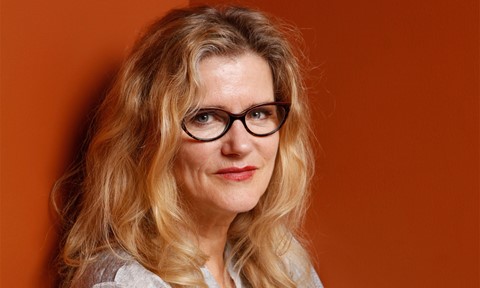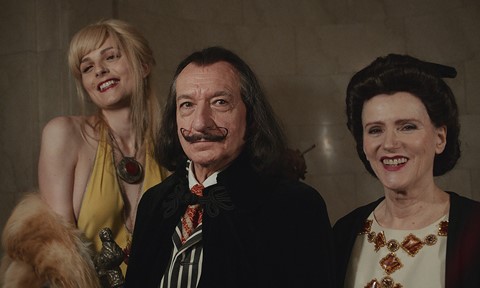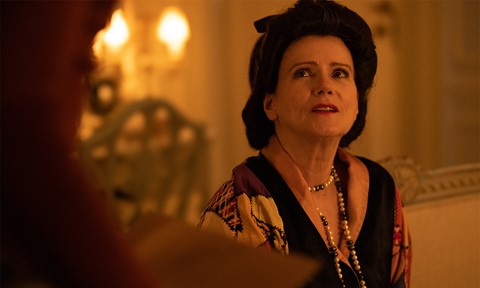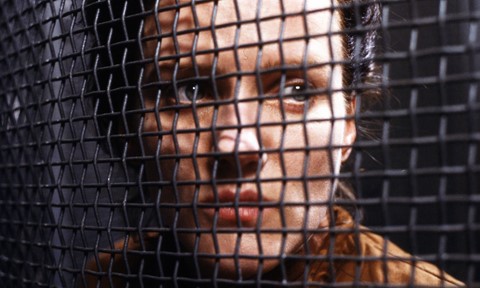Masterfully complex


Photo: Matt Carr
Her thin lips painted red, her pantsuit dark, her hair neatly pinned back, Gala Dalí, who is supposed to be the wife and muse of a world-famous artist, resembles a strict governess. Dalí himself crouches on the tiled kitchen floor of his beachside villa on the Costa Brava and cries like a child. The septuagenarian, played by Sir Ben Kingsley, whines and sobs until she finally appears: his Gala, famous for her avarice, her extramarital affairs, and her immense influence on the greatest painter of his time.
Dalí, the maestro, has cut his finger and is now crying for fear that the wound could become infected with tetanus. Gala, taken from the arms of her lover, is the only one who may comfort him. She enters the kitchen. Cold and lacking mystique only a moment ago, she now kneels on the floor next to her husband and blows on his cut. She kisses his boo-boo, gently strokes his back. Her melodic voice resembles that of a mother who comforts a child mainly by acknowledging his pain.
Even in brief moments in DALÍLAND, Barbara Sukowa succeeds in portraying her character, Gala, as surprisingly conflicted and yet authentic. Just a moment ago, Gala was in the car with James, a young assistant. His point of view guides us through the film and ponders Salvador Dalí, the genius who is preparing an exhibition in New York in the 1970s. “Why does Dalí have an old wife?” Gala comments disdainfully on the judgmental looks of Americans. This is a film about two vain individuals who remind each other that they are old — after 50 years of marriage, inevitably so.
In real life, Gala was ten years older than Dalí, having been born in the Russian Empire in 1894. Sukowa shows us Gala as a proud, sexually liberated woman who nevertheless struggles with aging. She lends her a proximity that her character does not naturally deliver, enabling us to imagine what it might have been like to live with a demanding genius for several decades.


Barbara Sukowa as Gala Dalí
Barbara Sukowa is herself married to an artist. Born in Bremen in 1950, she moved to Brooklyn thirty years ago. She took along her sons from previous relationships, had another son, and by now there’s a granddaughter as well. It was always difficult for her to spend weeks away from her children during filming. Even Margarethe von Trotta, with whom she collaborated on many projects, had to convince her to do it, Sukowa told Germany’s Tagesspiegel newspaper in 2020. It’s nice to actually be able to look back on a filmography comprised of such well-considered moves.
Barbara Sukowa has been a character actress since the 1970s. After receiving her training, she spent ten years on the stage before achieving stardom through the Fassbinder films BERLIN ALEXANDERPLATZ and LOLA in the early 1980s. Fassbinder saw in her a bit of Marilyn Monroe, whom he liked very much, Sukowa once told the newspaper Die Zeit. Singing and acting a little childlike as well, her Lola shone on the nightclub stage of the Villa Fink and in the arms of Armin Müller-Stahl. Fassbinder’s postwar interpretation of Lola from THE BLUE ANGEL, the role that took Marlene Dietrich to the pinnacle of acting fame, again scored points by employing long legs and a singing voice, but a few other things as well. Lola in the film is indeed a whore and a saint — but she’s also a mother, daughter, wife, and lover, a bit of everything. Sukowa thus laid the foundation for a wonderful film career that would always be dedicated to the complexity of female characters.


Barbara Sukowa together with Hannes Jaenicke in ROSA LUXEMBURG
As in ROSA LUXEMBURG, in which a woman trusts her intellect and follows her political convictions. She doesn’t shy away from prison, is willing to sacrifice her personal safety for her belief in the workers’ movement, and is nevertheless allowed to talk about wanting a child and feeling love or anger. She is no saint, no one to project anyone’s ideas onto. Portraying this woman not as a victim of men, but as a thinker, earned Barbara Sukowa the award for best actress at Cannes in 1986. This film was the second of seven collaborations with director Margarethe von Trotta. Great female role models remained a focus of this creative female team; films about polymath Hildegard von Bingen and philosopher Hannah Arendt followed.
In 2021, Barbara Sukowa became the first German to receive the Prix Lumière for best actress, which she shared with her colleague Martine Chevallier, for the French-language film TWO OF US, a remarkably accomplished debut by young Italian director Filippo Meneghetti. In this film, an old lesbian couple plans to finally leave their small town in France and move to Rome, but one of them has grown children who have known nothing about their mother’s twenty-year relationship. Time and again, Mado, played by Chevallier, fails to tell her family the truth about her “friendly neighbor”. A stroke suddenly renders that discussion moot, as it does the couple’s plans to move, and the film’s point of view shifts.

Barbara Sukowa’s Nina is now the focus of the story. What is she supposed to do? Her partner is in the hospital, dependent on care, and her relatives know nothing about the status and the deep bond between the two women. Nina of course has a key to Mado’s apartment. Her own apartment on the same floor is half-empty; after all, the women have long shared their day-to-day life as well as a bed. Now Nina is glued to her peephole, watching the nurse wheel Mado to the grocery store. This is heartbreaking, but Nina does not remain helpless, always managing to find her way to Mado. As secrets gradually come to light, it’s inevitable that the situation with regard to the family will escalate. This is a love story that doesn’t dwell on the age or sexual orientation of its fabulous protagonists, but that asks the right questions about complex lives and creates the space for real characters.
In art and in society, a struggle for equality is still going on for women and for all underrepresented groups who are only allowed to serve their niche or an audience’s expectation of attractiveness or clowning around. What would it be like to make these roles as conflicted and meaningful as those of the familiar white male protagonists? Barbara Sukowa’s career serves as an example that such diverse roles and relevant stories that go off the beaten path do of course exist. After all, a female character in film doesn’t become strong by having a profession. A character is strong when she has a personality, goals, misgivings, flaws, and especially when she is played by Barbara Sukowa.


